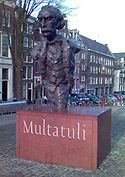- Multatuli
-
Multatuli 
Eduard Douwes Dekker, also known as MultatuliBorn Eduard Douwes Dekker
2 March 1820
Amsterdam, North Holland, NetherlandsDied 19 February 1887 (aged 66)
Nieder Ingelheim, Rhine, NetherlandsOccupation Writer Religion Atheism Eduard Douwes Dekker (2 March 1820 – 19 February 1887), better known by his pen name Multatuli (from Latin multa tuli, "I have carried much"), was a Dutch writer famous for his satirical novel, Max Havelaar (1860), which denounced the abuses of colonialism in the Dutch East Indies (today's Indonesia).
Contents
Biography
Dekker was born in Amsterdam. His father, a ship's captain, intended his son for trade, but this humdrum prospect disgusted him, and in 1838 he went out to Java and obtained a post as a civil servant. He moved from one posting to another, until, in 1851, he became assistant-resident at Ambon, in the Moluccas. In 1857 he was transferred to Lebak, in the Bantam residency of Java (now Banten province). By this time, however, all the secrets of Dutch administration were known to him, and he had begun to openly protest about the abuses of the colonial system. Consequently he was threatened with dismissal from his office for his openness of speech. Dekker resigned his appointment and returned to the Netherlands in a state of fierce indignation.
He was determined to expose in detail the scandals he had witnessed, and he began to do so in newspaper articles and pamphlets. Little notice, however, was taken of his protestations until, in 1860, he published his novel Max Havelaar under the pseudonym of Multatuli. Dekker's new pseudonym, which is derived from Latin, means, "I have suffered much", or, more literally "I have borne much" referring to himself, as well as, it is thought, to the victims of the injustices he saw. An attempt was made to ignore this irregular (for the 1860s) book, but in vain; it was read all over Europe. The exposure of the abuse of free labour in the Dutch Indies was thorough, although colonialist apologists accused Dekker's terrible picture of being overdrawn. Multatuli now began his literary career, and published Love Letters (1861), which, in spite of their mild title, were mordant, unsparing satires.
Although the literary merit of Multatuli's work was widely criticised, he received an unexpected and most valuable ally in Carel Vosmaer who published a book (The Sower 1874) praising him.[1] He continued to write much, and to publish his miscellanies in uniform volumes called Ideas, of which seven appeared between 1862 and 1877 and also contain his novel Woutertje Pieterse.
Dekker left Holland, and went to live in Ingelheim am Rhein near Mainz, where he made several attempts to write for the stage. One of his pieces, The School for Princes (published in 1875 in the fourth volume of Ideas), expresses his non-conformist views on politics, society and religion. He moved his residence to Nieder Ingelheim, on the Rhine, where he died in 1887.
Dekker had been one of Sigmund Freud’s favourite writers. He heads the list of ‘ten good books’ which Freud drew up in 1907. [2]
In June 2002, the Dutch Maatschappij der Nederlandse Letterkunde (Society for Dutch Literature) proclaimed Multatuli the most important Dutch writer of all time.[3]
Multatuli's brother, Jan Douwes Dekker, is a grandfather of Ernest Douwes Dekker (also known as Danudirja Setiabudi, an Indonesian National hero).
See also
References
 This article incorporates text from a publication now in the public domain: Chisholm, Hugh, ed (1911). Encyclopædia Britannica (11th ed.). Cambridge University Press.
This article incorporates text from a publication now in the public domain: Chisholm, Hugh, ed (1911). Encyclopædia Britannica (11th ed.). Cambridge University Press.Further reading
- Max Havelaar ISBN 0-14-044516-1
External links
- 150 jaar Max Havelaar
- Multatuli Hotel Amsterdam
- Multatuli Museum
- Max Havelaar Foundation
- Works by Multatuli at Project Gutenberg
- hear the first pages of the Max Havelaar in Dutch and read a rough English translation
Categories:- 1820 births
- 1887 deaths
- Colonialism
- Dutch atheists
- Dutch civil servants
- Dutch novelists
- Dutch writers
- Dutch East Indies
- People from Amsterdam
- Pseudonymous writers
Wikimedia Foundation. 2010.

